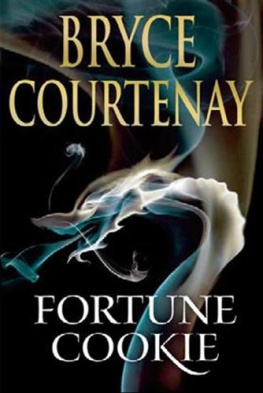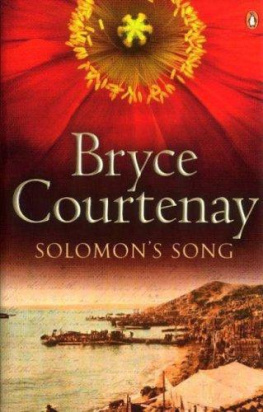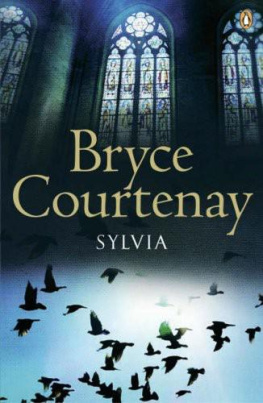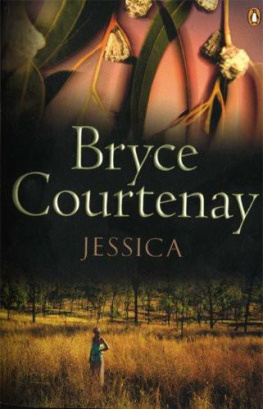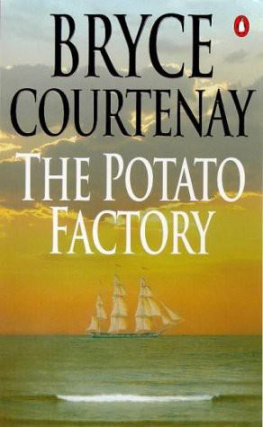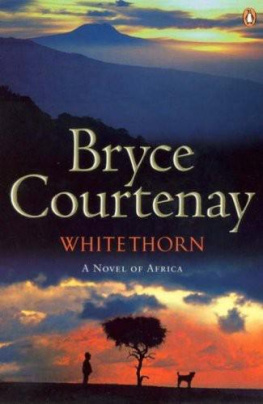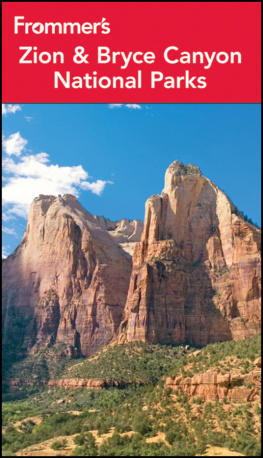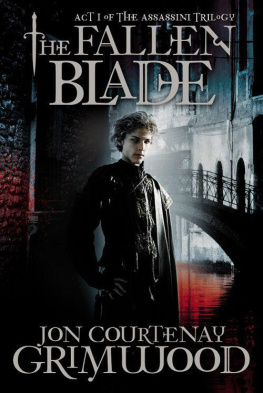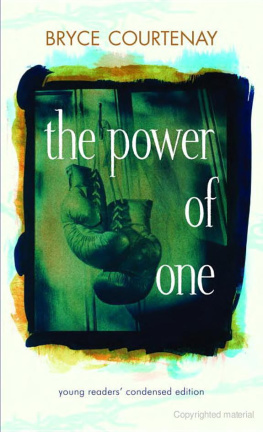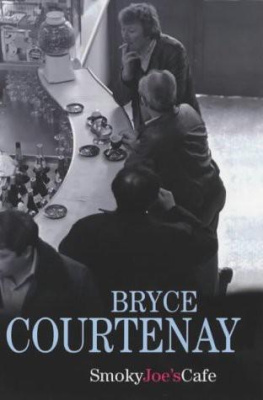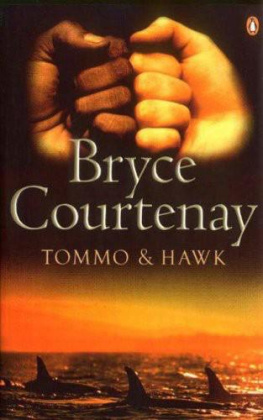Bryce Courtenay - Fortune Cookie
Here you can read online Bryce Courtenay - Fortune Cookie full text of the book (entire story) in english for free. Download pdf and epub, get meaning, cover and reviews about this ebook. year: 2010, publisher: Penguin Group (Australia), genre: Non-fiction. Description of the work, (preface) as well as reviews are available. Best literature library LitArk.com created for fans of good reading and offers a wide selection of genres:
Romance novel
Science fiction
Adventure
Detective
Science
History
Home and family
Prose
Art
Politics
Computer
Non-fiction
Religion
Business
Children
Humor
Choose a favorite category and find really read worthwhile books. Enjoy immersion in the world of imagination, feel the emotions of the characters or learn something new for yourself, make an fascinating discovery.
- Book:Fortune Cookie
- Author:
- Publisher:Penguin Group (Australia)
- Genre:
- Year:2010
- Rating:3 / 5
- Favourites:Add to favourites
- Your mark:
- 60
- 1
- 2
- 3
- 4
- 5
Fortune Cookie: summary, description and annotation
We offer to read an annotation, description, summary or preface (depends on what the author of the book "Fortune Cookie" wrote himself). If you haven't found the necessary information about the book — write in the comments, we will try to find it.
Fortune Cookie — read online for free the complete book (whole text) full work
Below is the text of the book, divided by pages. System saving the place of the last page read, allows you to conveniently read the book "Fortune Cookie" online for free, without having to search again every time where you left off. Put a bookmark, and you can go to the page where you finished reading at any time.
Font size:
Interval:
Bookmark:
FORTUNE
COOKIE
BRYCE
COURTENAY
VIKING
an imprint of
PENGUIN BOOKS
B OOKS BY B RYCE C OURTENAY
The Power of One
Tandia
April Fools Day
A Recipe for Dreaming
The Family Frying Pan
The Night Country
Jessica
Smoky Joes Cafe
Four Fires
Matthew Flinders Cat
Brother Fish
Whitethorn
Sylvia
The Persimmon Tree
Fishing for Stars
The Story of Danny Dunn
Fortune Cookie
T HE A USTRALIAN T RILOGY
The Potato Factory
Tommo & Hawk
Solomons Song
Also available in one volume,
as The Australian Trilogy
For
Robbee Minicola
Contents
PART ONE
Singapore Sling
CHAPTER ONE
MY NAME IS SIMON KOO . Im fourth-generation Australian. My great-great-grandfather, Koo Bing Fuk, came out from China in the late 1850s to the gold rush, got lucky (ha ha) working the tailings the white miners had abandoned, and by persistence and hard work made a few bob; enough to get a bit of a start, anyway.
Back then even a bit was considered a lot. Life wasnt easy. All the maxims of the time recommended caution, and nobody is more frugal than a Chinese peasant. Never waste a grain of winter rice is the Chinese equivalent of A penny saved is a penny earned . Ah Koo, as he would commonly be known, needed no such advice.
After removing the ore that could be won with a moderate amount of labour, many white prospectors quickly became discouraged at least, that was true for much of the human detritus that had washed in from the four corners with their arses hanging out of their trousers. Most had dreamed of a quick and lazy fortune, but finding gold usually meant backbreaking work from dawn to dusk and a bit of luck besides. They deeply resented the idea of those dirty yellow bastards the celestials, Mongolians, Chinks, as they were variously known showing them up by working hard and striking paydirt in claims the white miners had abandoned out of idleness.
It soon became apparent to all the layabouts, drunks and no-hopers that the celestials were fair game, not officially welcome at the diggings, or anywhere else, for that matter. So when they were pissed theyd play Lets go get us a Chink. Beating up a Mongolian was considered an almost honourable pastime and certainly not an incident that need trouble an indifferent officer of the law. The many incidents of Chinese beaten to death were simply recorded as mining accidents.
A favourite trick was for a group of whites to corner a Chinaman and throw him to the ground facedown. One would sit on his legs, while another would plant a boot on his shoulder and another on his wrist. Taking a bowie knife, the ringleader would run it around the circumference of the pigtail, then rip it off the back of his head. This was gleefully known among the white miners as hog-tailing, a term borrowed from the Californian gold rush.
Soon the cry went up in New South Wales and Victoria: The Chinamen are stealing our gold! No more, celestials! Both colonies quickly locked and chained the welcoming gate.
However, Ah Koo had arrived in the second wave of Chinese crammed into the holds of the three-masted barques from Shanghai that diverted to the tiny port of Robe in the free settlers colony of South Australia, where no restrictions or landing fees applied. Robe was a great distance from the nearest goldfields, so Ah Koo, along with others, walked more than 700 miles overland to the Yass area of New South Wales, ignoring the shorter journey to the Victorian diggings.
When I was at uni I went to the archives and searched through some of the old newspapers. There were numerous reports of farmers and townspeople seeing long files of Chinese in conical hats, their pigtails flopping behind them, snaking across the black soil plains of New South Wales. They wore blue cotton smocks and calf-length blue trousers, and bore heavy loads balanced on long bamboo poles.
Not long after Ah Koo arrived at the Lambing Flat diggings, on a night with a full moon that was so bright you could almost thread a needle by it, he woke suddenly to see a group of white prospectors armed with pick handles approaching the area where he and several other Chinese had begun to work abandoned tailings. Hed been warned of such attacks and, hesitating only long enough to call a warning to his neighbour Wong Ka Leung, a man from north Shanghai, he ran and hid in the bush nearby.
His neighbour, exhausted from a long days labour on the miners sluice, failed to wake or hear his warning cry. Ah Koo watched helplessly as drunken white miners surrounded Ah Wongs tent, dragged him out, threw him to the ground and proceeded to hog-tail him then beat him to a pulp. The leader of the pack triumphantly looped the bloody pigtail through his belt, then, yelling and whooping like a pack of wild dogs, they moved on to find further celestial prey.
Ah Koo dragged his bleeding, unconscious countryman into his tent and, over a period of several weeks, nursed him back to health, undoubtedly saving his life. Moreover, on the morning after Ah Wongs brutal hog-tailing, Ah Koo prayed to the gods for forgiveness, then cut off his own pigtail.
He was a Chinese peasant and therefore accustomed to a world of hardship and injustice; sitting on your arse or complaining wasnt an option, and physical harm would not be a discouragement. He was beaten more than once, but each time hed pick himself up, rub woodlock oil or dit da jow the universal cure-all most Chinese miners carried on his cuts and bruises and return to his sluice. Its better here than in China, he would tell himself, although he was not always convinced.
Ah Koo had lost his entire family in the Taiping Rebellion, led by the psychopath general Hong Xiuquan, a converted Christian who improbably termed himself Younger Brother of Christ and who, in the name of his crucified older brother, butchered an estimated twenty million of his countrymen, including three generations of Ah Koos family.
In China the family is everything, both your identity and your reason for existence; without family you are simply a wandering ghost. Ah Koo decided he must ask for his ancestors permission and, as the lone survivor of his ancient family, begin again elsewhere. Like others from southern China, he had heard rumours of the Australian gold rush or, as it was termed, New Yellow Gold Mountain new because California (the original Yellow Gold Mountain) had been depleted. How he got to Australia was never explained. Perhaps he worked his passage or had sufficient money to pay for the fare in steerage, because he wasnt recruited as indentured labour by one of the many unscrupulous Chinese or European profiteers.
Indentured labourers were virtual slaves, made to sleep on the ground in leaky tents or in crude huts infested with fleas and lice, given barely enough to eat, and usually cheated out of the pittance they earned by being charged for their accommodation and two bowls of rice each day. It was not why they had come to the New Yellow Gold Mountain. They too could dream of fortunes to be made. Even stupid men know that if they are going to endure hardship, then it should be for gain. At the first opportunity they would abscond and head straight for the goldfields. There theyd discover they were prevented from staking a claim by the bloody-minded white miners, and so would be forced to work the tailings of the gwai-lo prospectors who took the easy gold and discarded the rest.
Ah Koo knew he was on his own, that his life mattered to no one and that no family would grieve his passing or burn paper money to pay for a more comfortable existence for him in the hereafter. His seed was all that was left. It was up to him to start again. Just a little more, he told himself, then I can buy a bit of land and send money home to China to buy a wife. There was no point returning to China, where only his ancestral spirits resided. This new land would become his home.
Next pageFont size:
Interval:
Bookmark:
Similar books «Fortune Cookie»
Look at similar books to Fortune Cookie. We have selected literature similar in name and meaning in the hope of providing readers with more options to find new, interesting, not yet read works.
Discussion, reviews of the book Fortune Cookie and just readers' own opinions. Leave your comments, write what you think about the work, its meaning or the main characters. Specify what exactly you liked and what you didn't like, and why you think so.

